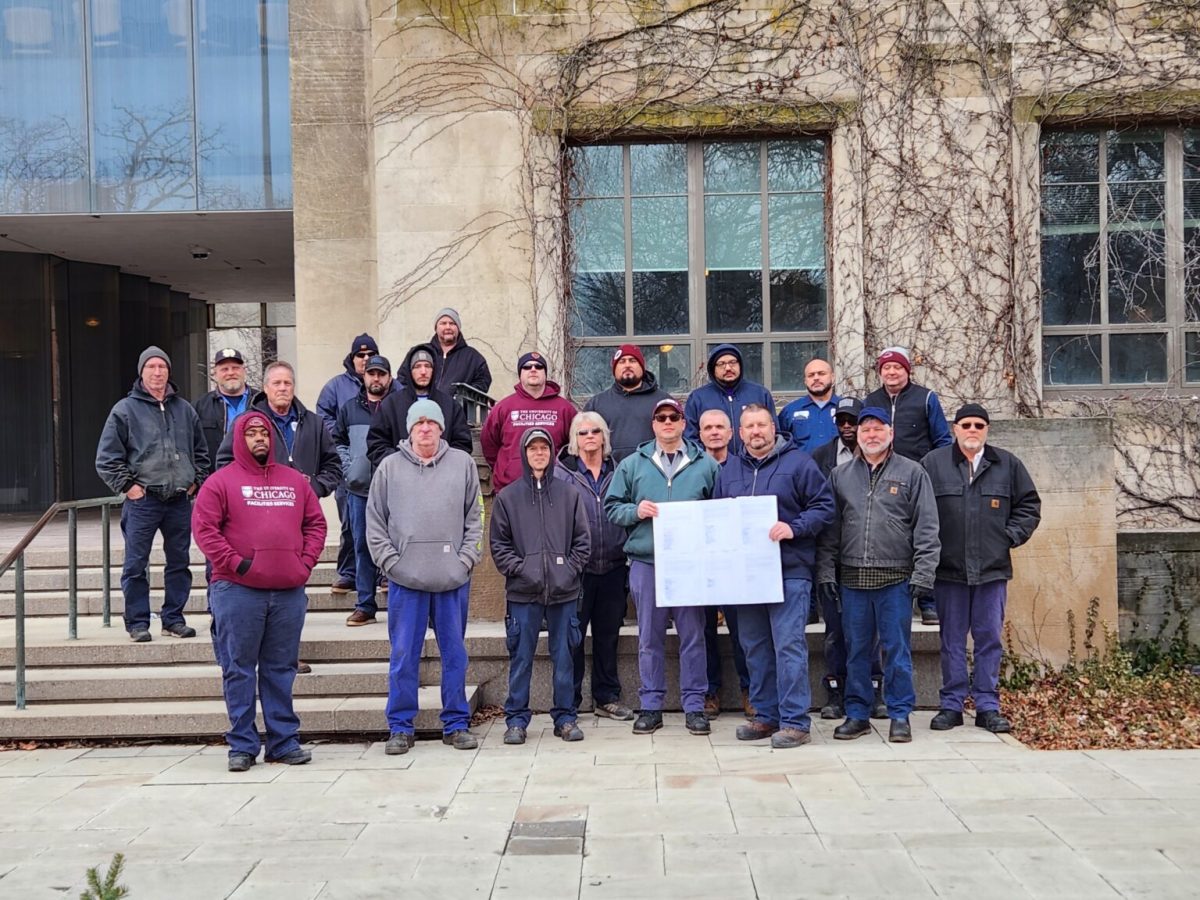Members of Service Employees International Union (SEIU) Local 73, the union representing skilled facilities workers at the University, delivered a petition to University President Paul Alivisatos on January 31 calling for a fair contract and expressing willingness to strike amid ongoing negotiations between the two parties.
“We, the members of SEIU Local 73, work hard to keep the University running,” the members wrote in the petition. “Our work keeps the University safe for students, faculty, and staff. But without adequate staffing, the safety of our university community is at risk.”
Building refrigeration engineer Tom Wright, the union steward for the Booth School of Business and a member of Local 73’s bargaining committee, told The Maroon that staffing issues were key to the union’s demands in the petition. “The big issue is staffing and our issues attracting new talent,” he said. “We have an aging workforce. And that’s a real concern, because we’re hitting a point where we’re losing people faster than we’re getting them.”
Wright said the University needed to offer better pay and funding for worker training to address staffing challenges. “We’re looking for pay commensurate with attracting new talent and the retention of that talent, and part of the retention would [include] adequate training levels,” he said. “We’re looking for more vocational, technical training to get current members like new hires up to speed as well as progress the skill set of current employees.”
“We are not competitive with what’s out in the market right now for what we’re doing in this industry,” Wright said. “We had an issue here in [the Charles M. Harper Center] where we were down a guy for almost a year and trying to recruit someone for that role was very challenging. Not only was it hard getting the number of applicants, but the ones that we did get in were far below the qualifications we wanted. A lot of that goes back to the pay that we have.”
Joe Pruim, the president of the UChicago unit of SEIU Local 73, told The Maroon that without changes, Facilities Services faces long-term issues. “We asked the University, on one of our bargaining items, we wanted to have a training differential—if someone comes and wants to be a carpenter, and they’re not up to speed on everything, if I have to do my original job and train them, we were asking for a differential on that. That was denied by the University,” he said. “It’s just become a status quo problem. Doing more with less seems like it has become a model for the University. And unfortunately, we’re losing people due to that.”
“We are skilled craftsmen,” he added. “You do not find skilled craftsmen in the bargain rack.”
Other University employees, including collegiate assistant professors and non-tenure-track faculty, also fall under the Local 73 umbrella but bargain separately from Facilities Services workers. Skilled trades workers represented by SEIU are still operating under a contract that formally expired in October. As negotiations stretched into this calendar year, SEIU agreed to use a federal mediator at the University’s request. The parties plan to meet next on February 26.
“The University is negotiating in good faith with SEIU Local 73, which represents 150 employees in the Facilities Services bargaining unit,” the University wrote in a statement to The Maroon. “As we have done in the past, both parties agreed to utilize the services of a federal mediator to help reach mutually agreeable terms for a successor collective bargaining agreement. We are deeply grateful for the contributions of Facilities Services employees to the work of the University, and we look forward to working constructively on a contract that will benefit employees and serve the University community.”
According to Wright, the University has proposed a 11.5 percent pay increase over four years, compared with 13 percent increases for two other trade unions. The University did not respond to a request to confirm those offers. Pruim and Wright also noted that SEIU—unlike other trade unions at the University—helps provide funding for employees’ healthcare plans, making nominal comparisons in pay scales misleading. “You could be looking at an 8 percent increase in healthcare costs,” Wright said. “These other trade groups have fully funded healthcare, they’re not seeing that increase. So when the University compares us to them, it is not apples to apples.”
The union managed to secure prescription safety glasses in the latest negotiations, but to Pruim, it was a hollow victory. “I cannot even understand at what point a safety item is a benefit,” he said. “It should be a necessity.”
“A big component of this petition was not just bringing these issues to [Alivisatos’s] door, but also showing that we stand in solidarity,” Wright said. “We have many different bargaining units, trade shops under our group, but we all support each other. That was the big message that we wanted to send: we are a unified group. And we are willing to fight for what’s right.”
Pruim said SEIU had not received any response to the petition from the University.









